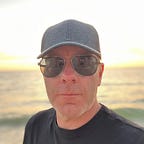No blue screens in bed. You got this.
If blue screen glasses existed in 2010, I was unaware of them. Carpal tunnel syndrome and other physiological ailments were very much real, but at the end of the day, our entertainment still emitted from screens several feet away from our eyes. That’s all changed. The eyes of the modern human spend up to 19 hours a day within a couple of feet of a “blue light” screen, such as a smartphone, tablet, or notebook computer.
In the blink of an eye (no pun intended), the nighttime behavior of our species has changed. We now lay there, six inches from radiated light, scrolling through social media or watching Youtube videos. The TV on the wall may be off — but our phones are on. Before you know it, you’ve scrolled past one too many clickbait articles, and the calming bedtime routine your body needs is…lost. The gap between when we put our devices to sleep and when we actually fall asleep is being delayed by a cycle of “revenge bedtime procrastination.”
- Off, but not forgotten: On average, what percentage of Americans have a television in their bedroom? (answer below)
Aside from the approximately 35% of the population that suffers from insomnia, many more people began to suffer from lost sleep when the pandemic hit. It wasn’t just out of fear or worry. It was also due to the elimination of boundaries between work life and home life, making it increasingly easy to leave screens on — right up until the moment of trying to fall asleep, and long past when our brains have asked to shut down.
Finding non-Zuckerberg-powered ways to wind down before bed is critical. Just one night of lost sleep can have a measurable impact on focus, performance, and productivity. Multiple nights of lost sleep can lead to burnout. In order for us to be effective leaders, a consistent reasonable transition from “blue light” to “counting sheep” is critical. “Consecutive sleep loss was associated with decreases in positive emotions, increases in negative emotions and greater frequency of severity of physical symptoms,” said Soomi Lee, a neurologist who published a study linking sleep and performance.
Switching off helps our brains move from the dopamine-driven emotions we experience from constant scrolling and problem-solving to a place where our brains go into hibernation.
Encourage your team to shut down their devices at least an hour before they turn in. Or leave their devices in another room than the bedroom. Or read a book. Or have a conversation. The world’s most successful athletes know their performance depends on restful sleep. Why are business leaders so far behind? Try this with me — no blue screens in bed. Just this week. Let me know how it goes at leighf@turbinelabs.com.
- Sleep app knee, ah?: After how many days with less than 8 hours of sleep are athletes twice as likely to suffer from an injury? (answer below)
WHAT I’M READING
I was surprised to read last week that only about 20% of American workers are still working from home full-time. Turbine Labs has stayed largely remote, as we experiment with new ways to work in the post-pandemic era. The first part of the shift? Shortening our work week so that our team can re-energize and stay inspired. To do inspired work, you need to know when to slow down — Fast Company, October 5, 2021
Stress has always been a player at work, but now Wharton suggests getting older is just a part of the job. Wharton finance professor Marius Guenzel took a look at CEOs — and found they appear older than their age. Good news for Botox and fillers? I’ll let you know how my first session goes. How Stress Affects CEO Aging and Mortality — Knowledge at Wharton, September 28, 2021
YOU WON’T READ THIS ANYWHERE ELSE
This is a fascinating study that deserves a once-over if you’ve ever published thought leadership or have built out a campaign on your list of to-dos. On second thought, let me summarize it for you: Most consumers of thought leadership content think what’s being published is a load of junk. And that’s hurting brands. So after reading this article, head on over to the Turbine Labs website and sign up for a demo of our new Thought Leadership Briefing. Edelman and LinkedIn Study: Market Oversaturated with ‘poor-quality’ thought leadership — PR Week, October 4, 2021
TRIVIA ANSWERS
- Over 50% of Americans have a television somewhere in their bedroom. Talk about intimate screen time. (HomeX)
- Sleep loss may predispose athletes to twice as many injuries after just 7 days of inadequate sleep. (Practical Neurology)
This briefing was built using Turbine Labs’ Thought Leadership Enhancement Software.
Why not send Views from the Control Tower to a friend?
Been forwarded Views from the Control Tower? Great, sign up here.
